Hans Scholl
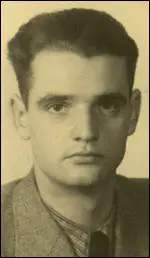
Hans Scholl, the son of Robert Scholl and Magdalena Scholl, was born in Forchtenberg on on 22nd September, 1918. (1) His father was elected mayor of Forchtenberg. Over the next few years he managed to get the railway extended to the town. He also had a community sports centre built in Forchtenberg but he was considered to be too progressive for some and in 1930 he was voted out of office. (2)
Hans had several sisters and brothers, Inge (b. 1917), Elisabeth (b. 1920), Sophie (b. 1921), Werner (b. 1922) and Thilde (b. 1925). "Hans Scholl was the dominant personality among them, and not only because of his status as older son and big brother. He had the dark good looks not uncommon in south German males, but a certain Italianate cast to his features refined the modeling of his face and made him handsomer than most. He was tall for his age, slender, and with a kind of tautness that came from energy seeking its outlet." (3)
Hans studied at the secondary school in Kunzelsau before the family moved to Ulm in 1932. "Robert Scholl had lived in several small towns in Swabia, an area of south-west Germany known for its rural charms, thrifty people, and spirit of independence, before settling in Ulm, where he opened his own office as a tax and business consultant. He was a big, rather heavyset man, with strong opinions and an unwillingness, if not an inability, to keep those opinions to himself." (4)
Hans Scholl and the Hitler Youth
Robert Scholl was a strong opponent of Adolf Hitler and was very upset when Hans and Werner joined the Hitler Youth and Sophie Inge and Elisabeth became members of the German League of Girls (BDM) in 1933. He argued against Hitler and the Nazi Party and disagreed with his children's views that he would reduce unemployment: "Have you considered how he's going to manage it? He's expanding the armaments industry, and building barracks. Do you know where that's all going to end." (5)
Elisabeth Scholl later pointed out why they rejected their father's advice: "We just dismissed it: he's too old for this stuff, he doesn't understand. My father had a pacifist conviction and he championed that. That certainly played a role in our education. But we were all excited in the Hitler youth in Ulm, sometimes even with the Nazi leadership." (6)
His sister, Inge Scholl later recalled: "Our family was a small, stable island in the ever stranger, incomprehensible swirl of events. But along with this feeling there was something else for Hans and my younger brother Werner, something which gave shape to their lives in the years between fourteen and eighteen and which filled them with indescribable high spirits." (7)
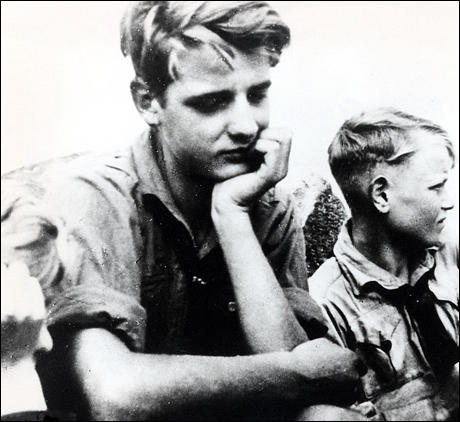
Robert Scholl held liberal opinions and allowed his children to make their own choices. According to Richard F. Hanser: "They could say whatever they wished, and they all had opinions. This was far from customary practice in German households, where, by long tradition, the authority of the father was seldom questioned or his statements challenged... His aversion to mindless nationalism was not only unchanged but stronger than before. In his dinner-table discussions with his children, he could interpret events for them with an insight unblurred by current prejudices or official pronouncements." (8)
In September 1936 David Lloyd George visited Nazi Germany. On his return to Britain he wrote: "I have just returned from a visit to Germany. ... I have now seen the famous German leader and also something of the great change he has effected.... One man has accomplished this miracle. He is a born leader of men. A magnetic dynamic personality with a single-minded purpose, a resolute will, and a dauntless heart. He is the national Leader. He is also securing them against that constant dread of starvation which is one of the most poignant memories of the last years of the war and the first years of the Peace. The establishment of a German hegemony in Europe which was the aim and dream of the old prewar militarism, is not even on the horizon of Nazism. (9)
Hans Scholl, now a local leader of the Hitler Youth, used Lloyd George's comments to defend Hitler against his father. "Why, the Führer is even being praised abroad! Here in the paper is an interview with Lloyd George, Britain's prime minister during the last war. He calls Hitler a great leader. He says he wishes that England had a statesman of her own like him." Robert Scholl replied: "I know the Nazis better than Lloyd George does. Believe me, they are wolves and wild beasts, and they are misusing the German people abominably." (10)
Disillusionment with Adolf Hitler
Hans Scholl, was chosen to be the flag bearer when his unit attended the Nuremberg Rally in 1936. His sister, Inge Scholl, later recalled: "His joy was great. But when he returned, we could not believe our eyes. He looked tired and showed signs of a great disappointment. We did not expect any explanation from him, but gradually we found out that the image and model of the Hitler Youth which had been impressed upon him there was totally different from his own ideal... Hans underwent a remarkable change... This had nothing to do with Father's objections; he was able to close his ears to those. It was something else. The leaders had told him that his songs were not allowed... Why should he be forbidden to sing these songs that were so full of beauty? Merely because they had been created by other races?" (11)
Sophie Scholl was very close to Hans and she also became disillusioned with Adolf Hitler. Shortly after Hans returned from Nuremberg, an important BDM leader arrived from Stuttgart to conduct an evening of ideological training for the girls in Ulm. When the members were asked if they had any preferences for discussion, Sophie suggested they read poems by Heinrich Heine, one of her favourite writers. The leader was appalled and pointed out that the left-wing, anti-war, Jewish writer, had his books burned and banned by Propaganda Minister Joseph Goebbels in 1933. Apparently, Sophie replied, "Whoever doesn't know Heine, does not know German literature." (12)
Elisabeth Scholl has argued that during this period all the Scholl children gradually became hostile to the government. They were undoubtedly influenced by the views of their parents but had been disappointed by the reality of living in Nazi Germany: "First, we saw that one could no longer read what one wanted to, or sing certain songs. Then came the racial legislation. Jewish classmates had to leave school." (13)
Arrest of the Scholl Family
Hans Scholl and some of his friends decided to form their own youth organization. Inge Scholl later recalled: "The club had its own most impressive style, which had grown up out of the membership itself. The boys recognized one another by their dress, their songs, even their way of talking... For these boys life was a great, splendid adventure, an expedition into an unknown, beckoning world. On weekends they went on hikes, and it was their way, even in bitter cold, to live in a tent... Seated around the campfire they would read aloud to each other or sing, accompanying themselves with guitar, banjo, and balalaika. They collected the folk songs of all peoples and wrote words and music for their own ritual chants and popular songs." (14)
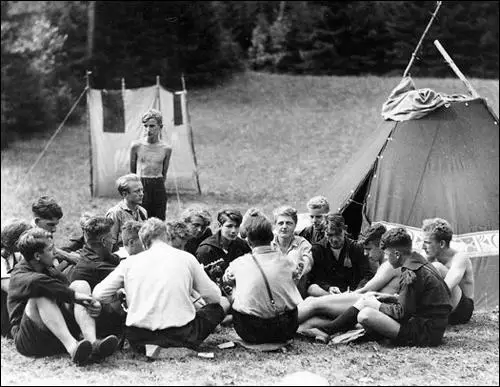
At the age of nineteen, every German, male or female, had to spend six months on a construction project or a farm. The National Labour Service was an attempt to keep the young under the supervision of government agencies as long as possible. It also removed thousands from the labour market and therefore reduced the unemployment statistics and kept young people off the streets where they might cause trouble. (15) Hans Scholl was assigned to road building near a place called Göppingen. The project was part of the Autobahn system, the network of roads across Germany, which was one of Hitler's most valued programs. (16)
Six months of National Labour Service was followed by conscription into the German Army. Hans always loved horses and he volunteered and was accepted for a cavalry unit in 1937. A few months later he was arrested in his barracks by the Gestapo. Apparently, it had been reported that while living in Ulm he had been taking part in activities that were not part of the Hitler Youth program. Sophie, Inge and Werner Scholl were also arrested. (17)
As Sophie was only sixteen, she was released and allowed to go home the same day. One biographer has pointed out: "She seemed too young and girlish to be a menace to the state, but in releasing her the Gestapo was letting slip a potential enemy with whom it would later have to reckon in a far more serious situation. There is no way of establishing the precise moment when Sophie School decided to become an overt adversary of the National Socialist state. Her decision, when it came, doubtless resulted from the accretion of offences, small and large, against her conception of what was right, moral, and decent. But now something decisive had happened. The state had laid its hands on her and her family, and now there was no longer any possibility of reconciling herself to a system that had already begun to alienate her." (18)
The Gestapo searched the Scholl house and confiscated diaries, journals, poems, essays, folk song collections, and other evidence of being members of an illegal organisation. Inge and Werner were released after a week of confinement. Hans was detained three weeks longer while the Gestapo attempted to persuade him to give damaging information about his friends. Hans was eventually released after his commanding officer had ensured the police that he was a good and loyal soldier. (19)
The Second World War
Hans Scholl studied medicine at the University of Munich. On the outbreak of the Second World War he became a member of the Second Student Medical Company. According to his biographer, Richard F. Hanser: "Hans Scholl walked the Munich streets in the field-grey uniform of Adolf Hitler's victorious Wehrmacht and gave every appearance of being a credit to it... His conduct was so satisfactory that he was promoted to sergeant." (20)
In the summer of 1940 Scholl was sent as a member of the medical corps that went with the German Army invading France. Although he observed little of the actual fighting as he was working at a field hospital where four hundred soldiers were being treated. As a medic he assisted during leg amputations and other operations. He was based in the town of Saint-Quentin and felt guilty about living in requisitioned houses. He told his parents in a letter: "I liked it better when we slept on straw. What am I - a decent person or a robber?" (21)
Scholl returned to his studies in Munich. He attended classes at the university, listened to lectures at various clinics around the city, and attended the wounded soldiers who had returned from fighting on the front-line. He told his sister Inge Scholl: "Going from bed to bed to hold out one's hand to people in pain is deeply satisfying. It's the only time I'm really happy. But it's madness just the same... If it weren't for this senseless war there would be no wounded to be cared for in the first place." (22)
White Rose Group
Hans Scholl made friends with other medical students who also questioned the morality of the Nazi government. This included Christoph Probst, Alexander Schmorell, Willi Graf, and Jugen Wittenstein. Hans' sister, Sophie Scholl joined him at the university in May 1942. (23) Hans soon emerged as the group's leader: "The role was tacitly bestowed on him by virtue of that quality in his personality that, in any group, made him the focus of attention. Alex Schmorell was usually at his side, his close collaborator. Between them, they arranged for meetings and meeting places.... Sometimes they met in Hans' room for impromptu talk and discussion. For larger meetings, they gathered at the Eickemeyer studio or the villa of Dr. Schmorell, an indulgent father who shared many of his son's views." (23a)
The group of friends had discovered a professor at the university who shared their dislike of the Nazi regime. Kurt Huber was Sophie's philosophy teacher. However, medical students also attended his lectures, which "were always packed, because he managed to introduce veiled criticism of the regime into them". (24) The 49 year-old professor, also joined in private discussions with what became known as the White Rose group. Hans told his sister, Inge Scholl, "though his hair was turning grey, he was one of them". (25)
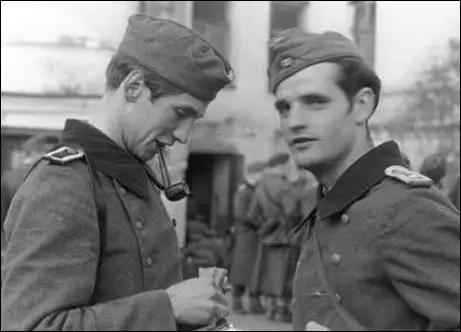
According to Elisabeth Scholl, the White Rose group was formed because of the execution of members of the resistance: "We learned in the spring of 1942 of the arrest and execution of 10 or 12 Communists. And my brother said, In the name of civic and Christian courage something must be done. Sophie knew the risks. Fritz Hartnagel told me about a conversation in May 1942. Sophie asked him for a thousand marks but didn’t want to tell him why. He warned her that resistance could cost both her head and her neck. She told him, I’m aware of that. Sophie wanted the money to buy a printing press to publish the anti-Nazi leaflets.” (26)
Alexander Schmorell played a leading role in the White Rose discussions. He also brought in others into the group. This included Traute Lafrenz, who had been studying medicine in Hamburg before enrolling at the University of Munich for additional courses. "Traute Lafrenz would have been an asset and an ornament to any group, being both unusually bright and unusually attractive. There was nothing of the tamed and domesticated Kinder, Kuche, Kirche (children, kitchen, and church) ilk about her." (26a)
Schmorell received a generous monthly allowance from his father and was able to buy a secondhand duplicating machine. He also bought a typewriter and got special printing paper and stencils. (26b) It was said that Schmorell was constantly urging the group to make the transition from talk to action. "What are we waiting for? Until the war is over and everybody points to us and says we tolerated such a regime without protest?" (26c)
In June 1942 the White Rose group began producing leaflets. They were typed single-spaced on both sides of a sheet of paper, duplicated, folded into envelopes with neatly typed names and addresses, and mailed as printed matter to people all over Munich. At least a couple of hundred were handed into the Gestapo. It soon became clear that most of the leaflets were received by academics, civil servants, restaurateurs and publicans. A small number were scattered around the University of Munich campus. As a result the authorities immediately suspected that students had produced the leaflets. (27)
The opening paragraph of the first leaflet said: "Nothing is so unworthy of a civilized nation as allowing itself to be "governed" without opposition by an irresponsible clique that has yielded to base instinct. It is certain that today every honest German is ashamed of his government. Who among us has any conception of the dimensions of shame that will befall us and our children when one day the veil has fallen from our eyes and the most horrible of crimes - crimes that infinitely outdistance every human measure-reach the light of day? If the German people are already so corrupted and spiritually crushed that they do not raise a hand, frivolously trusting in a questionable faith in lawful order in history; if they surrender man's highest principle, that which raises him above all other God's creatures, his free will; if they abandon the will to take decisive action and turn the wheel of history and thus subject it to their own rational decision; if they are so devoid of all individuality, have already gone so far along the road toward turning into a spiritless and cowardly mass - then, yes, they deserve their downfall." (28)
According to the historian of the resistance, Joachim Fest, this was a new development in the struggle against Adolf Hitler. "A small group of Munich students were the only protesters who managed to break out of the vicious circle of tactical considerations and other inhibitions. They spoke out vehemently, not only against the regime but also against the moral indolence and numbness of the German people." (29) Peter Hoffmann, the author of The History of German Resistance (1977) claimed they must have been aware that they could do any significant damage to the regime but they "were prepared to sacrifice themselves" in order to register their disapproval of the Nazi government. (30)
The second leaflet was published in the third week of June 1942 dealt with the treatment of Jews in Nazi Germany and in Eastern Europe. "Since the conquest of Poland three hundred thousand Jews have been murdered in this country in the most bestial way. Here we see the most frightful crime against human dignity, a crime that is unparalleled in the whole of history. For Jews, too, are human beings - no matter what position we take with respect to the Jewish question - and a crime of this dimension has been perpetrated against human beings. Someone may say that the Jews deserved their fate. This assertion would be a monstrous impertinence; but let us assume that someone said this - what position has he then taken toward the fact that the entire Polish aristocratic youth is being annihilated? (May God grant that this program has not fully achieved its aim as yet!) All male offspring of the houses of the nobility between the ages of fifteen and twenty were transported to concentration camps in Germany and sentenced to forced labor, and all girls of this age group were sent to Norway, into the bordellos of the SS!"
The leaflet then raised questions about the way the German population were responding to these atrocities: "Why tell you these things, since you are fully aware of them - or if not of these, then of other equally grave crimes committed by this frightful sub-humanity? Because here we touch on a problem which involves us deeply and forces us all to take thought. Why do the German people behave so apathetically in the face of all these abominable crimes, crimes so unworthy of the human race? Hardly anyone thinks about that. It is accepted as fact and put out of mind. The German people slumber on in their dull, stupid sleep and encourage these fascist criminals; they give them the opportunity to carry on their depredations; and of course they do so. Is this a sign that the Germans are brutalized in their simplest human feelings, that no chord within them cries out at the sight of such deeds, that they have sunk into a fatal consciencelessness from which they will never, never awake? It seems to be so, and will certainly be so, if the German does not at last start up out of his stupor, if he does not protest wherever and whenever he can against this clique of criminals, if he shows no sympathy for these hundreds of thousands of victims. He must evidence not only sympathy; no, much more: a sense of complicity in guilt. For through his apathetic behavior he gives these evil men the opportunity to act as they do; he tolerates this government which has taken upon itself such an infinitely great burden of guilt; indeed, he himself is to blame for the fact that it came about at all! " (31)
The third leaflet claimed that the goal of the White Rose was to bring down the Nazi government. It suggested the strategy of passive resistance that was being used by students fighting against racial discrimination in the United States: "We want to try and show them that everyone is in a position to contribute to the overthrow of the system. It can be done only by the cooperation of many convinced, energetic people - people who are agreed as to the means they must use. We have no great number of choices as to the means. The only one available is passive resistance. The meaning and goal of passive resistance is to topple National Socialism, and in this struggle we must not recoil from our course, any action, whatever its nature. A victory of fascist Germany in this war would have immeasurable, frightful consequences. The first concern of every German is not the military victory over Bolshevism, but the defeat of National Socialism." (32)
Kurt Huber
This leaflet was sent to Sophie Scholl's philosophy teacher, Kurt Huber. He was then invited to the home of Alexander Schmorell, one of the people who produced the leaflet. He turned up but was reluctant to get involved in a discussion about resisting the Nazi government. He was strongly anti-communist and was unhappy with the passage in the leaflet that said: "The first concern of every German is not the military victory over Bolshevism, but the defeat of National Socialism." He left the meeting without making it clear if he was willing to join the group. (33)
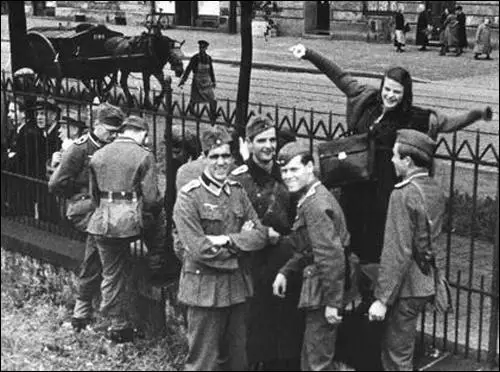
The group needed funds for the printing and mailing of the leaflets. Fritz Hartnagel who was on leave, gave Sophie 1,000 Reichsmarks, for what she told him was "a good purpose". Falk Harnack, a member of the Red Orchestra resistance group, also provided help. As well as sending the leaflets in the mail, members of the group carried them in suitcases to towns in southern Germany and delivering them to their supporters. This was highly dangerous as the Gestapo often carried out searches of passengers in trains. As a result of this activity, resistance groups were set up in Hamburg and Berlin. (34)
A fourth leaflet was published in July 1942. It included detailed of the large number of German soldiers killed during Operation Barbarossa: "Neither Hitler nor Goebbels can have counted the dead. In Russia thousands are lost daily. It is the time of the harvest, and the reaper cuts into the ripe grain with wide strokes. Mourning takes up her abode in the country cottages, and there is no one to dry the tears of the mothers. Yet Hitler feeds with lies those people whose most precious belongings he has stolen and whom he has driven to a meaningless death." The ended the leaflet with the words: "We will not be silent. We are your bad conscience. The White Rose will not leave you in peace!" (35)
In July 1942, Hans Scholl and his student friends, Christoph Probst, Alexander Schmorell and Willi Graf, were sent to the Eastern Front as medics. During their time in Poland and the Soviet Union they witnessed many examples of atrocities being committed by the German Army which made them even more hostile to the government. They were also upset by having to treat so many wounded and dying soldiers. It became clear that Germany was fighting a war it could not win. (36)
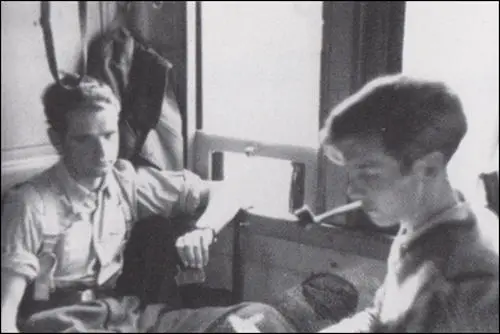
Hans Scholl later told his sister Inge about one incident that had a profound impact on him. "During the transport to the front their train had stopped for a few minutes at a Polish station. Along the embankment he saw women and girls bent over and doing heavy men's work with picks. They wore the yellow Star of David on their blouses. Hans slipped through the window of his car and approached. The first one in the group was a young, emaciated girl with small, delicate hands and a beautiful, intelligent face that bore an expression of unspeakable sorrow. Did he have anything that he might give to her? He remembered his Iron Ration - a bar of chocolate, raisins, and nuts - and slipped it into her pocket. The girl threw it on the ground at his feet with a harassed but infinitely proud gesture. He picked it up, smiled, and said, I wanted to do something to please you. Then he bent down, picked a daisy, and placed it and the package at her feet. The train was starting to move, and Hans had to take a couple of long leaps to get back on. From the window he could see that the girl was standing still, watching the departing train, the white flower in her hair." (37)
In December 1942, Hans Scholl went to visit Kurt Huber and asked his advice on the text of a new leaflet. He had previously rejected the idea of leaflets because he thought they would have no appreciable effect on the public and the danger of producing them outweighed any effect they might have. However, he had changed his mind and agreed to help Scholl write the leaflet. (38) Huber later commented that "in a state where the free expression of public opinion is throttled a dissident must necessarily turn to illegal methods." (39)
A Call to All Germans!
The first draft of the fifth leaflet was written by Sophie and Hans Scholl and Alexander Schmorell. (40) Kurt Huber then revised the material. The three men had long discussions about the content of the leaflet. Huber thought that the young men were "leaning too much to the left" and he described the White Rose group as "a Communist ring". (41) However, it was eventually agreed what would be published. For the first time, the name White Rose did not appear on the leaflet. The authors now presented them as the "Resistance Movement in Germany". (42)
This leaflet, entitled A Call to All Germans!, included the following passage: "Germans! Do you and your children want to suffer the same fate that befell the Jews? Do you want to be judged by the same standards as your traducers? Are we do be forever the nation which is hated and rejected by all mankind? No. Dissociate yourselves from National Socialist gangsterism. Prove by your deeds that you think otherwise. A new war of liberation is about to begin."
It ended with the kind of world they wanted after the war finished: "Imperialistic designs for power, regardless from which side they come, must be neutralized for all time... All centralized power, like that exercised by the Prussian state in Germany and in Europe, must be eliminated... The coming Germany must be federalistic. The working class must be liberated from its degraded conditions of slavery by a reasonable form of socialism... Freedom of speech, freedom of religion, the protection of individual citizens from the arbitrary will of criminal regimes of violence - these will be the bases of the New Europe." (43)
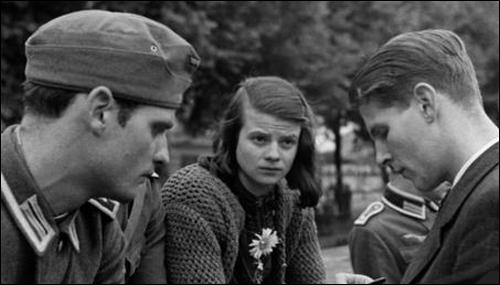
The Gestapo later estimated that the White Rose group distributed around 10,000 copies of this leaflet. Sophie Scholl and Traute Lafrenz purchased the special paper needed, as well as the envelopes and stamps from a large number of shops to avoid suspicion. Each leaflet was turned out one by one, night after night. "In order to stay awake and to function during the day, they took pep pills from the military clinics where the medics worked." (44) The conspirators had to ensure that the Gestapo could not trace the source to Munich so the group had to post their leaflets from neighbouring towns." (45)
The authorities took the fifth leaflet more seriously than the others. One of the Gestapo's most experienced agents, Robert Mohr, was ordered to carry out a full investigation into the group called the "Resistance Movement in Germany". He was told "the leaflets were creating the greatest disturbance at the highest levels of the Party and the State". Mohr was especially concerned by the leaflets simultaneous appearance in widely separated cities including Stuttgart, Vienna, Ulm, Frankfurt, Linz, Salzburg and Augsburg. This suggested an organization of considerable size was at work, one with capable leadership and considerable resources. (46)
Execution of Sophie & Hans Scholl
On 13th January, 1943, the Gauleiter of Bavaria, Paul Giesler, addressed the students of University of Munich in the Main Auditorium of the Deutsche Museum. He argued that universities should not produce students with "twisted intellects" and "falsely clever minds". Giesler went on to state that "real life is transmitted to us only by Adolf Hitler, with his light, joyful and life-affirming teachings!" He went on to attack "well-bred daughters" who were shirking their war duties. Some women in the audience began calling out angry comments. He responded by arguing that "the natural place for a woman is not at the university, but with her family, at the side of her husband." The female students at the university should fulfill their duties as mothers instead of studying. He then added that "for those women students not pretty enough to catch a man, I'd be happy to lend them one of my adjutants". (47)
Women students began shouting abuse at Giesler. He then ordered their arrest by his SS guards. Male students came to their aid and fights began all over the auditorium. Those who managed to escape ran out of the museum and after forming themselves in a large group, began marching in a procession in the direction of the university. They linked arms as they marched singing songs of solidarity. However, before they got to the university armed police forced them to disperse. (48)
The White Rose group believed there was a direct connection between their leaflets and the student unrest. They decided therefore to print another 1,300 leaflets and to distribute them around the university. On 18th February, 1943, Sophie and Hans Scholl arrived at the University of Munich with a suitcase packed with leaflets. According to Inge Scholl: "They arrived at the university, and since the lecture rooms were to open in a few minutes, they quickly decided to deposit the leaflets in the corridors. Then they disposed of the remainder by letting the sheets fall from the top level of the staircase down into the entrance hall. Relieved, they were about to go, but a pair of eyes had spotted them. It was as if these eyes (they belonged to the building superintendent) had been detached from the being of their owner and turned into automatic spyglasses of the dictatorship. The doors of the building were immediately locked, and the fate of brother and sister was sealed." (49)
Jakob Schmid, a member of the Nazi Party, saw them at the University of Munich, throwing leaflets from a window of the third floor into the courtyard below. He immediately told the Gestapo and they were both arrested. They were searched and the police found a handwritten draft of another leaflet. This they matched to a letter in Scholl's flat that had been signed by Christoph Probst. Following interrogation, they were all charged with treason. (50)
Sophie, Hans and Christoph were not allowed to select a defence lawyer. Inge Scholl claimed that the lawyer assigned by the authorities "was little more than a helpless puppet". Sophie told him: "If my brother is sentenced to die, you musn't let them give me a lighter sentence, for I am exactly as guilty as he." (51)
Sophie was interrogated all night long. She told her cell-mate, Else Gebel, that she denied her "complicity for a long time". But when she was told that the Gestapo had found evidence in her brother's room that proved she was guilty of drafting the leaflet. "Then the two of you knew that all was lost... We will take the blame for everything, so that no other person is put in danger." Sophie made a confession about her own activities but refused to give information about the rest of the group. (52)
Friends of Hans and Sophie had immediately telephoned Robert Scholl with news of the arrests. Robert and Magdalena went to Gestapo headquarters but they were told they were not allowed to visit them in prison over the weekend. They were not told that there trial was to begin on the Monday morning. However, another friend, Otl Aicher, telephoned them with the news. (53) They were met by Jugen Wittenstein at the railway station: "We have very little time. The People's Court is in session, and the hearing is already under way. We must prepare ourselves for the worst." (54)
Sophie's parents tried to attend the trial and Magdalena Scholl told a guard: "I’m the mother of two of the accused." He responded: "You should have brought them up better." (55) Robert Scholl was forced his way past the guards at the door and managed to get to his children's defence attorney. "Go to the president of the court and tell him that the father is here and he wants to defend his children!" He spoke to Judge Roland Freisler who responded by ordering the Scholl family from the court. The guards dragged them out but at the door Robert was able to shout: "There is a higher justice! They will go down in history!" (56)
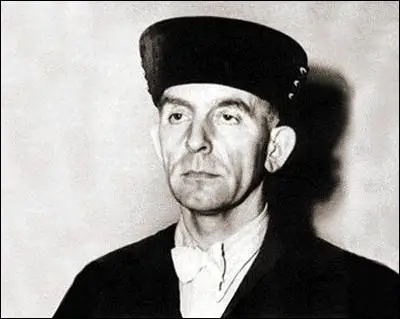
Later that day Sophie Scholl, Hans Scholl and Christoph Probst were all found guilty. Judge Freisler told the court: "The accused have by means of leaflets in a time of war called for the sabotage of the war effort and armaments and for the overthrow of the National Socialist way of life of our people, have propagated defeatist ideas, and have most vulgarly defamed the Führer, thereby giving aid to the enemy of the Reich and weakening the armed security of the nation. On this account they are to be punished by death. Their honour and rights as citizens are forfeited for all time." (57)
Werner Scholl was in court in his German Army uniform. He managed to get to his brother and sister. "He shook hands with them, tears filling his eyes. Hans was able to reach out and touch him, saying quickly, Stay strong, no compromises." (58)
Robert and Magdalena managed to see their children before they were executed. Their daughter, Inge Scholl, later explained what happened: "First Hans was brought out. He wore a prison uniform, he walked upright and briskly, and he allowed nothing in the circumstances to becloud his spirit. His face was thin and drawn, as if after a difficult struggle, but now it beamed radiantly. He bent lovingly over the barrier and took his parents' hands... Then Hans asked them to take his greetings to all his friends. When at the end he mentioned one further name, a tear ran down his face; he bent low so that no one would see. And then he went out, without the slightest show of fear, borne along by a profound inner strength." (59)
Magdalena Scholl said to her 22 year-old daughter: "I'll never see you come through the door again." Sophie replied, "Oh mother, after all, it's only a few years' more life I'll miss." Sophie told her parents she and Hans were pleased and proud that they had betrayed no one, that they had taken all the responsibility on themselves. (60)
Else Gebel shared Sophie Scholl's cell and recorded her last words before being taken away to be executed. "How can we expect righteousness to prevail when there is hardly anyone willing to give himself up individually to a righteous cause.... It is such a splendid sunny day, and I have to go. But how many have to die on the battlefield in these days, how many young, promising lives. What does my death matter if by our acts thousands are warned and alerted. Among the student body there will certainly be a revolt." (61)
They were all beheaded by guillotine in Stadelheim Prison only a few hours after being found guilty. A prison guard later reported: "They bore themselves with marvelous bravery. The whole prison was impressed by them. That is why we risked bringing the three of them together once more-at the last moment before the execution. If our action had become known, the consequences for us would have been serious. We wanted to let them have a cigarette together before the end. It was just a few minutes that they had, but I believe that it meant a great deal to them." (62) It was reported that Hans Scholl's last words were "Long live freedom!" (63)
Primary Sources
(1) Inge Scholl, The White Rose: 1942-1943 (1983)
During the transport to the front their train had stopped for a few minutes at a Polish station. Along the embankment he saw women and girls bent over and doing heavy men's work with picks. They wore the yellow Star of David on their blouses. Hans slipped through the window of his car and approached. The first one in the group was a young, emaciated girl with small, delicate hands and a beautiful, intelligent face that bore an expression of unspeakable sorrow. Did he have anything that he might give to her? He remembered his "Iron Ration" - a bar of chocolate, raisins, and nuts - and slipped it into her pocket. The girl threw it on the ground at his feet with a harassed but infinitely proud gesture. He picked it up, smiled, and said, "I wanted to do something to please you." Then he bent down, picked a daisy, and placed it and the package at her feet. The train was starting to move, and Hans had to take a couple of long leaps to get back on. From the window he could see that the girl was standing still, watching the departing train, the white flower in her hair.
Then he saw the eyes of an old Jewish man walking at the rear of a column of forced laborers. It was the finely modeled face of a scholar. Hans read there such an abyss of suffering as he had never before beheld. On impulse he
took out his tobacco pouch and furtively pressed it in the old man's hand. Never would Hans forget the quick flash
of joy which ignited in those eyes.He remembered too that spring day in a first-aid station at home. One of the wounded men was to be discharged; the doctors had done a splendid job of patching him together. But just before his dismissal the wound suddenly and for no apparent reason began to bleed and could not be stopped. It lay close to the jugular vein of the neck, and there was but one thing to do: to find the vein and tie it. However, all efforts were useless; the man bled to death under the doctors' hands. Hans went out into the corridor, deeply shaken. At that moment he met the young wife of the man who had died. She had come to call for her husband: beautiful, radiant, blissful in her expectation, carrying a large bouquet of bright flowers.
When, when will the state finally recognize tnat it has no higher duty than to safeguard the happiness of the millions of ordinary people? When finally will the state forget about the ideals that ignore the needs of simple everyday life? And when will it understand that a small step, however difficult it may be, taken in the direction of peace for the individual, as for nations, is greater than victory in battle?
(2) Indictment against Hans Scholl drawn up by the Reich Attorney General (21st February, 1943)
The accused Hans Scholl occupied his thoughts for a long time with the political situation. He arrived at the conclusion that just as in 1918, so also after the seizure of power by the National Socialists in 1933, it was not the majority of the German masses but the intellectuals in particular who had failed politically.
He therefore decided to prepare and distribute leaflets intended to carry his ideas to the broad masses of the people. He therefore decided to prepare and distribute leaflets intended to carry his ideas to the broad masses of people. He bought a duplicating machine, and with the help of a friend, Alexander Schmorell, with whom he had often discussed his political views, he acquired a typewriter. He then drafted the first leaflet of the White Rose and claims singlehandedly to have prepared about a hundred copies and to have mailed them to addresses chosen from the Munich telephone directory. In doing so, he selected people in academic circles particularly, but also restaurant owners, who, he hoped, would spread the contents of the leaflets by word of mouth.
These seditious pamphlets contain attacks on National Socialism and on its cultural-political parties in particular; further, they contain statements concerning the alleged atrocities of National Socialism, namely the alleged murder of the Jews and the alleged forced deportation of the Poles.
(3) Extract from the first leaflet published by White Rose (1942)
Nothing is so unworthy of a civilized nation as allowing itself to be "governed" without opposition by an irresponsible clique that has yielded to base instinct. It is certain that today every honest is ashamed of his government. Who among us have any conception of the dimensions of shame that will befall us and our children when one day the veil has fallen from our eyes and the most horrible of crimes - crimes that infinitely outdistance every human measure - reach the light of day?
(4) Extract from the second leaflet published by White Rose (1942)
It is impossible to engage in intellectual discourse with National Socialism because it is not an intellectually defensible program. It is false to speak of a National Socialist philosophy, for if there were such an entity, one would have to try by means of analysis and discussion either to prove its validity or to combat it. In actuality, however, we face a totally different situation. At its very inception this movement depended on the deception and betrayal of one's fellow man; even at that time it was inwardly corrupt and could support itself only by constant lies. After all, Hitler states in an early edition of "his" book (a book written in the worst German I have ever read, in spite of the fact that it has been elevated to the position of the Bible in this nation of poets and thinkers); "It is unbelievable, to what extent one must betray a people in order to rule."
We do not want to discuss here the question of the Jews, no do we want in this leaflet to compose a defence or apology. No, only by way of example do we want to cite the fact that since the conquest of Poland three hundred thousand Jews have been murdered in this country in the most bestial way. Here we see the most frightful crime against human dignity, a crime that is unparalleled in the whole of history.
(5) The fifth White Rose leaflet was entitled, Leaflet of the Resistance (February, 1943)
Germans! Do you and your children want to suffer the same fate that befell the Jews? Do you want to be judged by the same standards as your traducers? Are we do be forever the nation which is hated and rejected by all mankind? No. Dissociate yourselves from National Socialist gangsterism. Prove by your deeds that you think otherwise. A new war of liberation is about to begin. The better part of the nation will fight on our side. Cast off the cloak of indifference you have wrapped around you. Make the decision before it is too late! Do not believe the National Socialist propaganda which has driven the fear of Bolshevism into your bones. Do not believe that Germany's welfare is linked to the victory of National Socialism for good or ill. A criminal regime cannot achieve a victory. Separate yourself in time from everything connected with National Socialism. In the aftermath a terrible but just judgment will be meted out to those who stayed in hiding, who were cowardly and hesitant.
(6) Münchner Neueste Nachrichten (22nd February, 1943)
On February 22, 1943, the People's Court, convened in the Court of Assizes Chamber of the Palace of Justice, sentenced to death the following persons: Hans Scholl, aged 24, and Sophia Scholl, aged 21, both of Munich, and Chrstoph Probst, aged 23, of Innsbruck, for their preparations to commit treason and their aid to the enemy. The sentence was carried out on the same day.
Typical outsiders, the condemned persons shamelessly committed offences against the armed security of the nation and the will to fight of the German people by defacing houses with slogans attacking the state and by distributing treasonous leaflets. At this time of heroic struggle on the part of the German people, these despicable criminals deserve a speedy and dishonorable death.
Student Activities
The Political Development of Sophie Scholl (Answer Commentary)
The White Rose Anti-Nazi Group (Answer Commentary)
Kristallnacht (Answer Commentary)
Adolf Hitler's Early Life (Answer Commentary)
Heinrich Himmler and the SS (Answer Commentary)
Trade Unions in Nazi Germany (Answer Commentary)
Adolf Hitler v John Heartfield (Answer Commentary)
Hitler's Volkswagen (The People's Car) (Answer Commentary)
Women in Nazi Germany (Answer Commentary)
German League of Girls (Answer Commentary)
